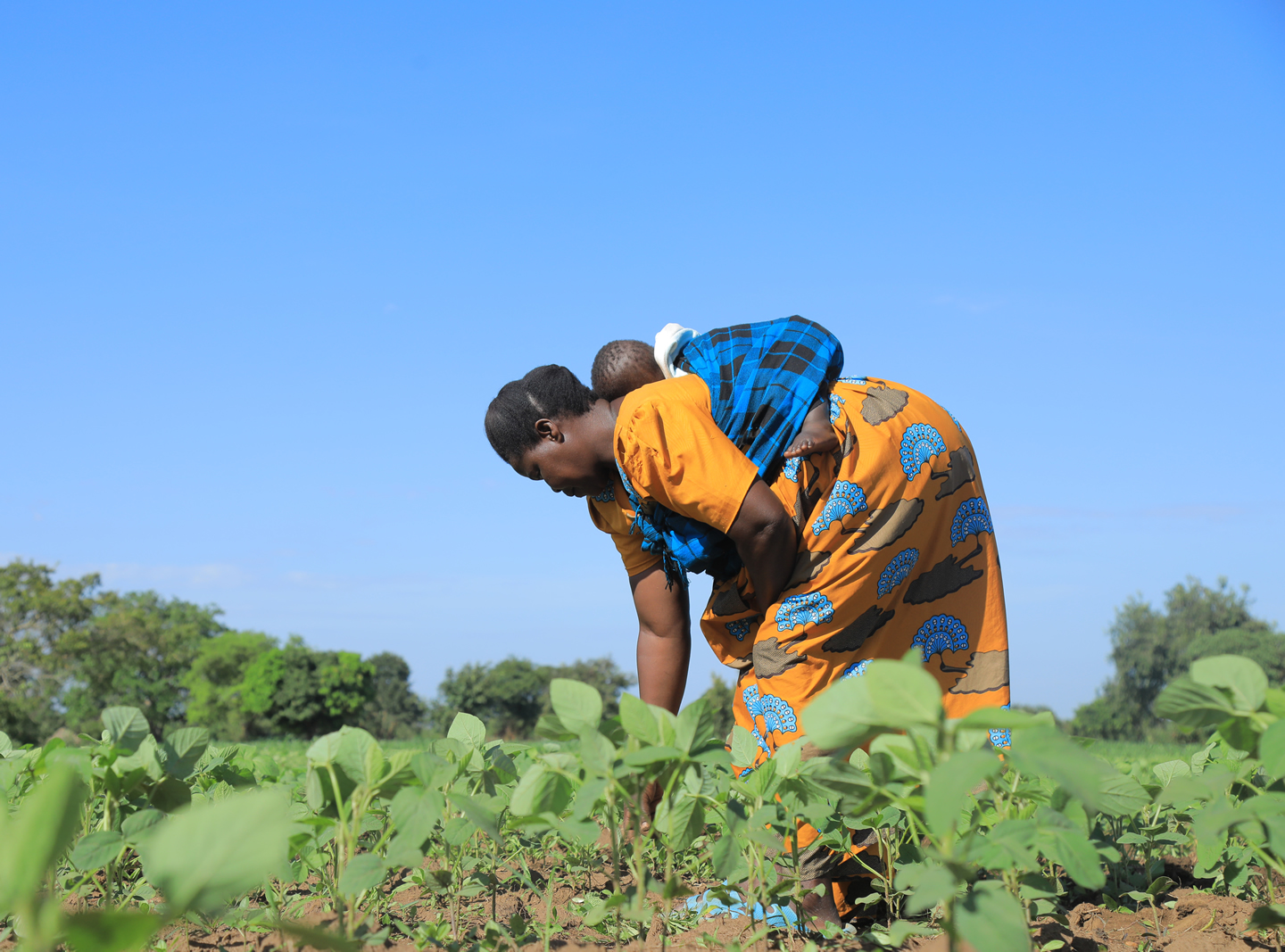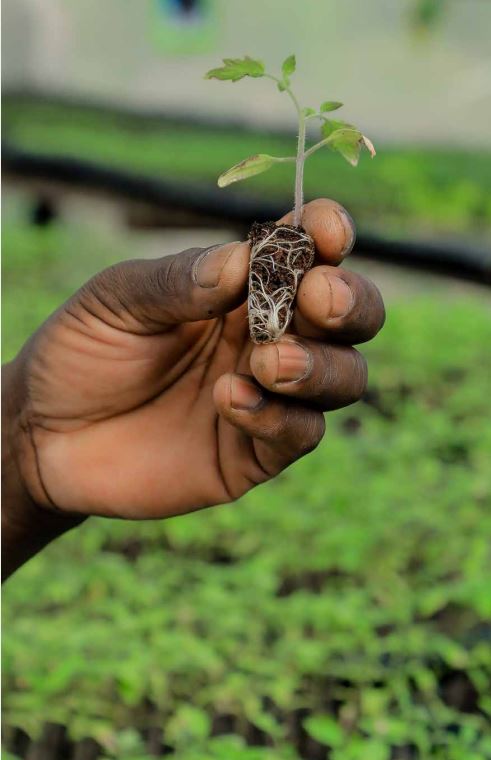
Case Study
Gender Inclusiveness in Popularisation of the Village Agent Model
Gender Inclusiveness in Popularisation of the Village Agent Model
Background
Northern Uganda – Transforming the Economy through Climate Smart Agribusinesses (NU-TEC) Market Development (MD) programme is a component of a seven-year DFID-funded programme that aims to increase the incomes and climate change resilience of poor men and women in Northern Uganda (NU) by (a) stimulating sustainable, pro-poor growth in selected agricultural markets and (b) improving the position of poor men and women within these market systems by making the market systems more inclusive for poor people. Funded by the United Kingdom (UK) Government and implemented by Palladium, NU-TEC MD provides expertise and consulting services to innovative businesses and shifts agricultural market dynamics in a way that supports triple bottom line (economic, social and environmental) improvements in firms and market performance. NU-TEC MD is currently facilitating the uptake of the Village Agent (VA) model by selected NU agribusinesses. Private sector investors in NU agriculture - processors, input suppliers, off takers and aggregators - have taken up working with VAs, men and women, in structuring their supply chains for efficiency and effectiveness. The VAs are businesses that offer embedded services to farmers which include village level aggregation, input supply, farmer training and finance. The model is geared towards increasing the demand for produce from smallholder men and women producers and to establish a template for support services that increase smallholder yields and incentivizes the commercialization of smallholder agriculture in NU. Subsequently, the VAs offer their partners market information feedback - that is useful for decision making on investment in NU agribusiness.
Objective and Purpose
Notwithstanding the relatively low proportion of Women Village Agents (WVAs), and that the VA model has been in operation for a short period, there is early evidence of benefits achieved by WVAs. These include improvements in income, self-efficacy and decision making among others, as further explained below and in Annex A. Self-efficacy: WVAs reported greater confidence and determination to succeed. This has been driven by a positive trajectory that has seen most of them graduate from being ordinary farmers to VAs, having reliable off takers, training opportunities, and a reliable network of farmers. Participation in decision making: WVAs participate significantly in decisions directly related to their business e.g. when and who to buy from, where to sell, and whether to take a financial advance. Off-takers deal directly with women and do not necessarily require their husbands to make decisions related to the trade, except occasionally for large cash advances to married WVAs.
The Challenge
NU-TEC MD partners with a number of processing companies (referred to as offtakers) for crops like soya bean, sesame, sunflower seeds, cotton, etc. The project supported these companies to adopt the village agent model for the procurement of these crops. Within a year (two seasons) of intervention with these companies, the village agent model posed to be beneficial to them compared to the direct procurement approach they used to follow. Although the proportion of WVAs is still low (see Table 1), interviews with the processing companies reveal that there are significant advantages of working with WVAs over MVAs. They said that WVAs:
- Supply better quality produce than MVAs
- Use the financial advance given by off-takers for the intended purpose, while MVAs are known to spend on other purposes, like buying land or remarrying
- provide more accurate accountability of the financial advance; in many cases, MVAs cannot explain certain expenses they make using the advance amount
- offer better prices to farmers, and this encourages farmers to continue supplying the crop to the VA and subsequently to the off-taker; MVAs try to get the maximum benefit from their business, and in many cases, tend to provide lower prices to farmers for higher profits
- are likely to be more committed to the off taker and not sell to competitors.
Key challenges mentioned by the off-takers faced by the WVAs in this business are mobility issues and multiple gender roles. Challenges for married WVAs are more than widowed or single ones, as the former have to depend on their husbands regarding their whereabouts and spending of income, while the latter have more freedom in spending as well as in terms of mobility.
We are happy with our trade with women village agents. We are thinking of mechanisms to provide bonuses (like 20 extra UGX per kg=) to our women village agents but realize that it will create problems with men village agents if we only introduce it for the women. Hence, we want to establish criteria for providing bonuses to all VAs with criteria on quality and volume – which I think will be beneficial for women village agents. We are also planning to hire 3 female field officers immediately to facilitate selection of women village agents.
Okelo Tony, Regional Manager, NBCC (cotton off-taker)

Key challenges mentioned by the offtakers faced by the WVAs in this business are mobility issues and multiple gender roles.
Research Analysis and Insights
Findings from Input Suppliers/ Companies
The project has been working with agro-input companies (mainly for seeds and agro-chemicals) to facilitate supply of the relevant inputs as well as information on good agricultural practices (GAP) to farmers via the village agents. This enables the farmers to have access to good quality inputs and hence supply good quality crops to the village agents. When asked about the comparing business relations of the input companies with men versus women village agents, they mentioned that WVAs are:
- trusted regarding quality, and they reach more farmers
- likely to offer more competitive prices (particularly for seeds) to farmers and make more sales per farmer
- more trusted with credit than men
- more committed to their business.
Although the overall volume of sales per season by WVAs is lower than MVAs, largely because of issues related to low working capital and transportation issues, input suppliers are keen to support WVAs to promote their business further. The national agro-input supplier, East Africa Seeds Ltd., mentioned that they are keen to support WVAs (by helping them prepare business plans) to open input stores next to their product storage facilities. This will enable WVAs to earn additional income from input supply besides ensuring farmers’ access to quality inputs for their production.
Findings from Farmers
Crops like sesame, sunflower seeds, and soya beans grow in abundance during the season in relatively most parts of Lira villages, while crops like millet grow in deep rural areas that are hard to reach. Selling these crops through village agents allows farmers to have sustainable access to buyers (who are the off-takers) as the village agents are people from their own community. During separate focus group discussions with farmers of WVAs and MVAs, the role of village agents and their relationships with farmers were discussed. Analysis of the FGD findings shows that WVAs:
- offer better prices than men
- have better communication skills with farmers
- provide social benefits to (especially female) farmers, e.g., credit to solve household emergencies, i.e., health care, school fees, etc.
- try to provide adequate time to monitor farmers’ performance
- are more approachable due to their good behavior


Solution implementation
Considering women face additional challenges than men to engage in business, NU-TEC MD should consider applying a combination of push and pull strategies to facilitate women’s role as VAs. Push strategies are designed to help very poor individuals and households build up a minimum level of assets (e.g., human, financial, social, cultural) that increases their capacity to engage more productively, creatively, and proactively with other public and private market actors and to transition out of a cycle of extreme poverty. Pull strategies facilitate the development of market systems in a manner that expands the diversity and quality of opportunities accessible to the very poor.